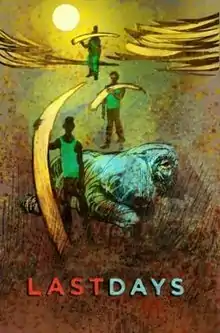Last Days (2014 film)
Last Days is a 2014 animated short documentary film about the decline of African elephant populations and the illegal ivory trade. It was directed by Kathryn Bigelow, whose other films include The Hurt Locker (2009),[1] Point Break (1991), and Zero Dark Thirty (2012). Featured in the film is footage of the 2013 Westgate shopping mall attack in Nairobi, Kenya, which has been attributed to the militant organization Al-Shabaab. The film advances the claim that terrorist networks derive much of their income from poached ivory.[2]
| Last Days | |
|---|---|
 Theatrical release poster | |
| Directed by | Kathryn Bigelow |
| Produced by | Megan Ellison |
| Written by | Scott Z. Burns |
| Edited by | James Ryan Mike Andres |
Release date |
|
Running time | 3 minutes |
| Country | United States |
| Language | English |
These claims, which were similar to ones made by several public officials including former US Secretary of State Hillary Clinton, UK Foreign Secretary William Hague, and Kenyan President Uhuru Kenyatta, were based on a 2013 report by the environmental nonprofit Elephant Action League (EAL).[2] However, a report published jointly by Interpol and the United Nations Environment Programme described EAL's findings as "highly unreliable".[2][3] According to the report, Al-Shabaab's primary income comes from the trade in charcoal, a significant source of deforestation.[3]
Reception
Last Days has been subjected to criticism for being overly simplistic and misleading in its portrayal of how to stop elephant poaching. Survival International, an international organization promoting tribal peoples’ rights, has asked for the film to be withdrawn.[4]
Survival Director Stephen Corry said: "The militarization of conservation is gaining momentum, and it is increasingly fuelling the brutal persecution of hunter-gathering tribes. Tribespeople who hunt to feed their families face arrest and beatings, torture and death at the hands of heavily armed park guards. “It seems that the link Bigelow’s film claims between the Westgate terrorist attack and ivory poaching doesn’t exist in real life. For certain conservationists to manipulate public opinion like this in favor of policies which exacerbate the destruction of tribal peoples, the best guardians of the natural world, is simply unacceptable.”[4]
See also
- Environmental crime
- The Ivory Game, 2016 documentary on the trade in ivory
- Short film
- Wildlife trade
References
- Foundas, Scott (28 September 2014). "Kathryn Bigelow Decries 'Last Days' of the African Elephant". Variety. Retrieved 19 December 2014.
- McConnell, Tristan (14 November 2014). "Illegal ivory may not be funding African terror group". USA Today; GlobalPost.
- Nellemann, Christian; et al., eds. (2014). The Environmental Crime Crisis: Threats to Sustainable Development From Illegal Exploitation and Trade in Wildlife and Forest Resources. Nairobi, Kenya: United Nations Environment Programme. pp. 78–81. ISBN 978-82-7701-132-5.
- "Kathryn Bigelow Decries 'Last Days' of the African Elephant". Survival International. 5 November 2015. Retrieved 7 March 2020.
Further reading
- Maguire, Tom; Haenlein, Cathy (21 September 2015). "An Illusion of Complicity: Terrorism and the Illegal Ivory Trade in East Africa". London, UK: Royal United Services Institute.
- Mcconnell, Tristan (29 October 2015). "The Ivory-Funded Terrorism Myth". The New York Times.
- Veríssimo, Diogo (16 January 2015). "Kathryn Bigelow and the bogus link between ivory and terrorism". The Conversation.